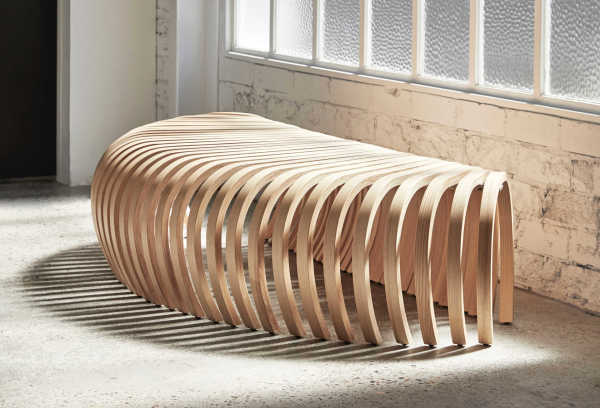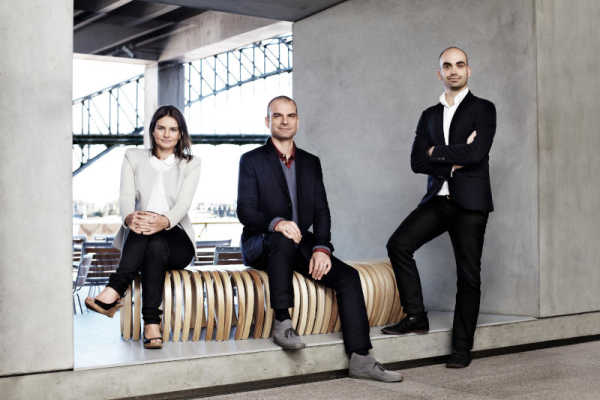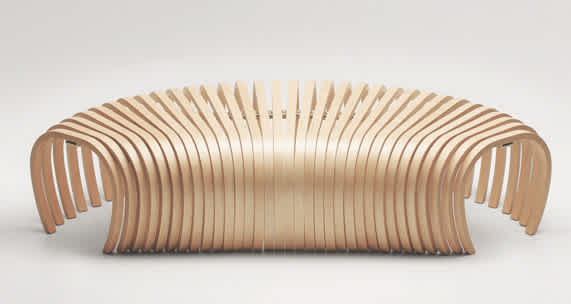Dynamic duo’s designs on sustainability
07 July 2021
Nicole Bittar
The true-to-form “Ribs Bench” by Australian collective DesignByThem takes pride of place in the Sydney Opera House, no less.
But its design adaptation is a salient lesson in replacing a non-natural material prototype with sustainable timber — for iconic and award-winning effect. “Delivering the ‘Ribs Bench’ to the Sydney Opera House was a highlight, for sure,” says DBT cofounder Sarah Gibson. “It was a win for Australian design – with (DBT’s) Stefan Lie being the original designer, as well as a win for sustainable timber manufacturing.”

When remastered by DBT codirectors, Sarah Gibson and Nicholas Karlovasitis, its material makeup was altered to reflect the company’s authentic aesthetic and environmentally conscious tenets.
“The ‘Ribs Bench’ was originally made from laminated MDF and timber veneer, but we changed the manufacturing process to be much more sustainable,” Sarah says. “This was achieved by using solid timber veneers for its core, thus reducing the VOCs (volatile organic compounds) and all-important FSC (Forest Stewardship Council) timber.”
DBT’s rationale for endorsing sustainable timber as the ‘ultimate renewable’ speaks for itself.
“I think the reasons these days are fairly well known — using certified timber means we are guaranteed that that the wood comes from legally harvested and well-managed forests and plantations, and also ensures that when a tree is harvested, another is planted in its place,” Sarah says.
“There’s also an emotional attachment to solid timber versus other materials. If used in the right context, it can prolong a product's life through its durability and graceful ageing process,” Sarah says.

The pragmatic benefits to crafting custom-made furniture from sustainably sourced Australian timbers are numerous.
“Solid timber can be repaired and thus the life of the product can be prolonged even further, although this restoration process is very hard to find these days,” Sarah says. “We’re lucky enough to work with craftsmen who can provide this repair service to our clients if and when they need it.”
In terms of eco-conscious finishes, the skilled design duo offer practical advice for budding DIY woodworkers.
“Two-pack polyurethane is great, but needs to be applied with a thick coating, otherwise it will come off and is very hard to repair,” Sarah advises. “If you use solid timber or a very thick veneer underneath, then the polyurethane can be sanded back enough and resprayed.”
Sarah and Nicholas also recommend poly-wax finishes with a water-based stain that embed into the timber. They say this can be easier to maintain and applied yourself, but be sure to refinish before the layering disappears to avoid staining the timber underneath.
As former Industrial Design (Honours) students and lecturers at the University of Technology Sydney, Nicholas and Sarah are equally in demand on the design conference circuit as they are on judging panels. Nicholas is the former Design Institute of Australia NSW Chair and Sarah is an advocate for sustainable design/creative business and judge of the Good Design Awards, among others.
Also in the winner’s circle, DBT’s accolades include two furniture and lighting product winners in the 2020 Good Design Gold Award Australia event and winner of the 2016 Chicago Athenaeum Good Design Award. They have also featured on countless award longlists and shortlists. The design team has exhibited internationally, and their work has been acquired by the Museum of Applied Arts and Sciences in Sydney.
A recent coup for Sarah and Nicholas was an invitation by Mass Architecture to design products in Rwanda for philanthropical organisation Howard G. Buffett Foundation.
Clearly, collaboration is at the core of DBT’s critical and commercial success. The 13-strong design team endorse sustainable design concepts and output by working collaboratively with designers and clientele. This approach led to a recent exhibition at the Milan Design Week. DBT products can also be found worldwide, supplying establishments such as Facebook, Dropbox, Google, The Sydney Opera House, Singapore Airport and Louis Vuitton.

Such notable achievements are remarkable, considering the design group was only established in 2007 and created its first sustainable timber item less than a decade ago.
“We developed our first timber product around nine years ago using FSC-certified rock maple timber. It was a flat-pack coat stand. The flat-pack nature of the product is also important to the product’s sustainability, allowing for efficient distribution,” Sarah says.
“Lifecycle analysis influences all of our products. The material is just the starting point, but it’s a very important one.”
DBT’s use of responsibly sourced, certified timber provides peace of mind, from a design and ecological perspective. This practice ensures that the impact of the finished product stems from the quality of the raw material.
“We have faith that the timber will always surprise and delight us,” Sarah says. “Its natural beauty always has this effect on us.”